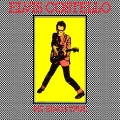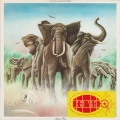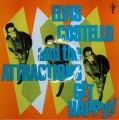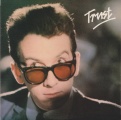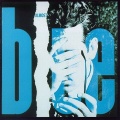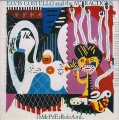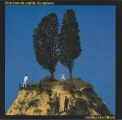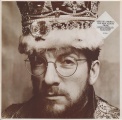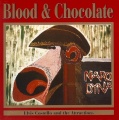|
Of all the musicians who emerged in the wake of punk in the late 1970s, Elvis Costello perhaps has the richest back-catalogue. Musically literate and stylistically restless, in some ways Costello had little in common with the punk movement; his lyrics are dense and filled with in-jokes and obscure references. But in other significant ways he fitted in perfectly; young Elvis Costello was angry, and he’s hardly a polished vocalist or guitarist.
Costello started his career with a trilogy of stripped back, angry albums: 1977’s My Aim Is True, 1978’s This Year’s Model, and 1979’s Armed Forces. The first was recorded with bar band Clover, while by his second record, Costello had recruited a virtuoso backing band, The Attractions. Drummer Pete Thomas, bassist Bruce Thomas, and keyboardist Steve Nieve provided nimble and energetic backing for Costello.
This early trilogy is generally Costello’s most acclaimed era, but personally I prefer his more musically expansive work in the early 1980s. In 1980 Costello made the first of many unexpected career moves, recording a full album of R&B for Get Happy!! He followed up with the eclectic Trust, an album of strait-laced country covers on Almost Blue, and Imperial Bedroom, where the sophisticated arrangements recalled The Beatles‘ studio-based albums.
I don’t appreciate Costello’s commercially oriented work with Langer and Winstanley in the mid 1980s, but he came back strongly in 1986 with two new albums; King of America is a country-flavoured of originals, while the raw Blood & Chocolate recalls his 1970s’ work with The Attractions.
I haven’t covered Costello’s career past his first ten years. He rarely worked with The Attractions after this time; his relationship with Bruce Thomas became strained, especially after Thomas wrote a book of thinly disguised anecdotes about life on the road (Costello is referred to as “The Singer”), although Nieve and Pete Thomas continue to work with Costello as The Imposters. But there are a ton of gems in those first ten years, and any fan of literate, melodic rock music would be advised to become familiar with albums like Imperial Bedroom and Armed Forces.
Elvis Costello Album Reviews
My Aim Is True | This Year’s Model | Armed Forces | Get Happy!! | Trust | Almost Blue | Imperial Bedroom | Punch The Clock | Goodbye Cruel World | King of America | Blood & Chocolate | Spike | (many more albums post 1980s….)
Favourite Album: Imperial Bedroom
Overlooked Gem: Trust
My Aim Is True
1977, 8/10
Elvis Costello had been gigging in pubs since 1970, but the proliferation of new labels with the birth of punk gave him the opportunity to cut his first album in 1976. His debut had originally been intended as demos for Dave Edmunds, as he was seen as a songwriter rather than a performer, but the demos he presented to Stiff Records were strong enough to be released as his first proper album. They were recorded with American country band Clover, whose members later went on to achieve success with Huey Lewis and the News and The Doobie Brothers. As a result, the album’s arrangements are less aggressive and more generic than Costello’s subsequent work with the Attractions, but he’s already a very good song-writer, and My Aim Is True is an incredibly assured debut.
The central song is the tender ‘Alison’, where the often bristly Costello shows empathy towards the down-trodden protagonist. There’s also the excellent white reggae of ‘Watching The Detectives’, probably the album’s other most remembered song. But there’s plenty of tuneful, memorable material scattered throughout the disc – the hooky ‘Less Than Zero’, the jaunty ‘Sneaky Feelings’, and the ironically titled ‘I’m Not Angry’.
My Aim Is True is a strong debut from Costello, and he’d soon recruit a backing band to make his music even sharper.
This Year’s Model
1978, 7.5/10
By the time Elvis Costello recorded his sophomore album, he had recruited a sharp backing band, The Attractions. With Steve Nieve’s organ work and Bruce Thomas’ busy bass, Costello’s guitar is pushed to the back, and the record is much more idiosyncratic and vital than with the generic Clover. Costello’s even angrier and more aggressive than on his debut and for many people, This Year’s Model is Costello’s best work, but I find that it doesn’t have as many memorable tunes as his best records, even though it bristles with nervous energy. The sound of Nieve’s Vox Continental organ also homogenises the album and makes it all blend together.
Most of the most memorable tracks are because of the attitude and aggression – there’s a pair of masturbation songs in ‘Pump It Up’ and ‘The Beat’, while ‘(I Don’t Want To Go To) Chelsea’ is aggressive and memorable, with Costello spitting out lyrics like “But there’s no place here for the mini-skirt waddle/Capital punishment, she’s last year’s model”. There’s the anti-fascist message of ‘Night Rally’, while This Year’s Model slows down for ‘Little Triggers’, a sensitive tale of overwrought teenage lust.
I know I’m in the minority on This Year’s Model, but it’s never fully connected for me, despite the great lyrics and impassioned delivery.
Armed Forces
1979, 9/10
They were both strong albums, but My Aim Is True had great songs that were undersold by the boring backing band, while This Year’s Model didn’t have enough memorable tunes to match the quality lyrics and aggressive band. Armed Forces, Costello’s third album, finds a neat middle ground, bringing catchy tunes to marry to The Attractions’ playing. Armed Forces is less vitriolic than This Year’s Model, but it’s still early Elvis Costello, with plenty of aggression and misogyny; the working title for the album was Emotional Fascism. The result is catchy pop music with an edge, especially in the very strong first half.
My favourite song on Armed Forces is the pulsing ‘Green Shirt’, which is representative of the emotional fascism label. ‘Accidents Will Happen’ is an excellent opener, tuneful and prettily arranged, while the single ‘Oliver’s Army’ follows a similar template, with Nieve’s piano. There are plenty of understated, hooky songs like ‘Goon Squad’ and ‘Party Girl’, while Armed Forces ends with a cover of Nick Lowe’s ‘(What’s So Funny ‘Bout) Peace, Love and Understanding’.
Even though it flags a little in the second half, Armed Forces is my favourite of Costello’s early albums. After this, Costello would become much more ambitious, veering between different guises, so Armed Forces is effectively the end of the first chapter of his career.
Get Happy!!
1980, 8/10
While touring Armed Forces in 1979, a drunk Costello became embroiled in an argument with Stephen Stills and Bonnie Bramlett, where he bad-mouthed black American musicians James Brown and Ray Charles. These remarks were reported to the press by Bramlett, forcing Costello to publicly apologise. Costello has since stated that it was a coincidence that his next album mined an R&B sound, and that it was a simply a result of his musical curiosity. Get Happy!! packs 20 songs into its 48 minutes, keeping up a furious pace with ten songs on each side of the original LP release. The Attractions sound great in this context; the R&B sound is a chance for Bruce Thomas’ bass lines to shine, and he’s the driving force behind a lot of these tunes.
With twenty, often short, songs, it’s inevitable that some of them don’t stick, but there are plenty of great songs tucked away on Get Happy!! ‘Love For Tender’ is a great opener with its Motown feel and Nieve’s organ stabs. The acoustic ‘New Amsterdam’ doesn’t fit in with the rest of Get Happy!! musically, but it’s perhaps the pinnacle of Costello’s ornate wordplay:
New Amsterdam it’s become much too much
Till I have the possession of everything she touches
Till I step on the brakes to get out of her clutches
Till I speak double dutch to a real double duchess''
‘Possession’ has plenty of hooks in Nieve’s piano and organ lines, while he also punctuates ‘King Horse’ with his piano lines. ‘Riot Act’ is a climatic album closer.
Get Happy!! isn’t all remarkable, but it showcases a young and confident Costello having conquered new wave and flexing his musical muscles in other directions.
Trust
1981, 8.5/10
After the genre exercise of Get Happy!!, Elvis Costello dropped back into usual album making routine with Trust. But while there’s no grand concept at work, it’s more diverse than his previous work. Costello has stated that he was paying attention to his contemporaries’ work on Trust, taking influences on board from The Clash, The Pretenders, The Police, and XTC. Additionally, he’s trying a lot of different styles – the excellent ‘Lover’s Walk’ uses the Bo Diddley beat, there’s an obvious country influence on ‘Different Finger’, and ‘Shot With His Own Gun’ is melodramatic in the style of Tin Pan Alley. The first two thirds of Trust is prime Elvis Costello, and some of my absolute favourite material from him, even though it falters over its last few tracks.
It’s the ballads that are often the most remarkable; ‘New Lace Sleeves’ is absolutely wonderful, perfectly arranged around Bruce Thomas’ prominent bass line. ‘You’ll Never Be A Man’ is pretty and melodic, with Nieve’s piano, but with some of Costello’s most pointed lyrics (“Are you so superior, are you in such pain? Are you made out of porcelain?”). Squeeze’s Glenn Tilbrook duets with Costello on the excellent rocker ‘From A Whisper To A Scream’, while ‘Strict Time’ is a vibrant showcase for The Attractions’ vibrant playing. The album does end weakly; ‘Shot With His Own Gun’ threatens to derail Trust, with Costello yammering his way through the painful melodrama, and the central metaphor of ‘Fish ‘n’ Chip Paper’ is clumsy and awkward. I haven’t discussed the bonus tracks on Costello’s albums, but ‘Sad About Girls’, written by Nieve, is very strong with its piano riffs and tender lyrics that contrast with Costello’s usual acerbic fare. There’s also a pretty take on Cole Porter’s ‘Love For Sale’.
Lop off the last three tracks, and Trust would be vying with Imperial Bedroom for the title of my favourite Elvis Costello album.
Almost Blue
1981, 7/10
After Costello’s foray into R&B on Get Happy!! and the eclectic Trust, his fans must have known to expect the unexpected. Even so, Costello’s next career move, to record an earnest set of country covers in Nashville, must have been a shock, even though Trust contained the country of ‘Different Finger’. Costello went as far to include a label that stated: “WARNING: This album contains country & western music and may cause offence to narrow minded listeners.” Despite the change in style, Costello is still accompanied by The Attractions, who sound authentically Nashville, even though they’re augmented by the pedal steel of John McFee (who played on My Aim Is True as part of Clover), backing vocals, and violin.
Despite his vocal limitations, Costello is effective as a country singer; he has enough of an emotional undertow in his voice that he suits these straightforward songs. But at the same time, Almost Blue feels more like a loving tribute from Costello to some of his own music – these versions are faithful, and the main revelation is how much of a country fan Elvis Costello is. He’s most effective on the slow tearjerkers like The Flying Burrito Brothers’ ‘Hot Burrito #1’ (titled as ‘I’m Your Toy’ here), ‘Good Year For The Roses’, and ‘Brown To Blue’.
Almost Blue is a fun album of lovingly crafted country covers, but it’s hard to compare it favourably to Costello’s early, classic albums of originals.
Imperial Bedroom
1982, 10/10
After recording five albums of original songs with Nick Lowe as producer, Elvis Costello elected to work with Geoff Emerick for 1982’s Imperial Bedroom. Emerick had previously worked with The Beatles, and Imperial Bedroom recalls the layered pop craft of The Beatles’ later 1960s albums. Steve Nieve is also an important architect of the album’s Sound, notably his over the top orchestral arrangement on ‘…And In Every Home’. Costello tried a lot of different musical approaches over the first decade of his career, but this is my favourite fit for him. The detailed approach fits his sophisticated writing, but it’s organic enough not to overwhelm the emotional undertow in his voice.
But Imperial Bedroom also boasts my favourite set of Costello songs – the great production and arrangements do elevate some of the minor material to greatness, but there are plenty of great songs here as well. Opener ‘Beyond Belief’ is verbose and urgent, while ‘A Long Honeymoon’ saunters with its accordion accompaniment. ‘You Little Fool’ uses a harpsichord, while ‘Man Out Of Time’ is the obvious centrepiece with its dramatic introduction, and it feels like a sequel to ‘You’ll Never Be A Man’ from Trust. ‘Pidgin English’ is perhaps a minor song, but the “neurotic erotica” line is one of the album’s most memorable moments.
Imperial Bedroom is Elvis Costello’s finest moment, where his literate, complex songs were given the most befitting treatment.
Punch The Clock
1983, 6/10
Elvis Costello went for the pop jugular with Punch The Clock, teaming up with the production team of Langer and Winstanley, who had helped to create hits for Madness and Dexy’s Midnight Runners. But it’s not a good fit for Costello’s music – plastering backing vocals and horn sections on constrains the fluid ensemble playing of The Attractions and feels as cynically calculated as the album title implies. But there are a handful of terrific songs here, and even though the overall sound of the Punch The Clock is dated, it’s worth hearing the highlights.
The smooth soul of ‘Everyday I Write The Book’ was Costello’s only US top 40 hit song, and it’s worthwhile, benefiting from the slick sound and backing singers, and showcasing Costello’s deftly punning lyrics. I’ve always found it confusing that the first wave of British punk ran out of steam before Margaret Thatcher’s conservative, repressive government, but two of Costello’s best songs here are directed at The Iron Lady – ‘Shipbuilding’ is stately and dignified with Chet Baker’s trumpet, while ‘Pills and Soap’ is tense and brooding.
I don’t have much use for the rest of Punch The Clock, as it doesn’t play to Costello’s strengths, but there are a few songs here that are essential.
Goodbye Cruel World
1984, not rated
I’ve never bothered with Goodbye Cruel World, because firstly it sounds like a weaker version of Punch The Clock, without the handful of outstanding songs; it’s another Langer-Winstanley production. And secondly Costello included a note on the reissue, stating “Congratulations! You’ve just purchased our worst album,” and has stated that he was distracted by personal issues, including a divorce.
King of America
1986, 7.5/10
Following the artistic failure of Goodbye Cruel World, Costello returned to a more organic approach for his two 1986 albums. The first, King of America, was recorded with T-Bone Burnett, capturing the same country flavour as Almost Blue, but comprised of Costello originals. These songs are simpler musically than Costello generally writes – instead of dazzling with complex changes, he’s often writing simple three chord songs, putting more of a focus on his lyrics. There are some impressive songs here, but when Costello doesn’t have first grade material to work with King Of America can be a little dull.
Unusually, the strongest songs are clustered at the end of the album. ‘Jack Of All Parades’ is pretty, while. ‘Suit Of Lights’ has another of Costello’s great cad put-downs (“if it moves then you fuck it/if it doesn’t then you stab it.”). And my favourite is the concluding ‘Sleep Of The Just’, with its quiet, elegant drama (“It was a powerful day/There were black crows on the road”). Other highlights include the anti-Cadbury protest of ‘Little Palaces’, but overall King of America drags at almost an hour, and could have used a trim; in particular the cover of ‘Don’t Let Me Be Misunderstood’ adds little to the original.
King of America is a worthwhile album, but without The Attractions’ spark and the dazzling chord sequences of his more sophisticated releases, it’s like Costello is trying to entertain with one hand tied behind his back.
Blood & Chocolate
1986, 8.5/10
Elvis Costello has described Blood & Chocolate as a pissed-off, divorced, 32 year old’s take on his early sound. He’s reunited with the Attractions and with producer Nick Lowe, and if all this sounds like a desperate attempt to recapture the earlier spark, improbably it works. Blood & Chocolate was recorded in a single room with the band playing together at stage volume, an unusual practice for a studio album. This gives Blood & Chocolate an energy and anger that had been absent from most of Costello’s 1980s’ work. The album’s lyrics were informed by Costello’s private life; he married Pogues bass-player Cait O’Riordan in 1986.
It’s the longest songs on Blood & Chocolate that leave the biggest impression. ‘I Want You’ is almost mantra-like in its quiet intensity, while ‘Tokyo Storm Warning’ is one of the loudest songs on the disc, full of rage and bluster. The closer ‘Next Time Around’ is uncharacteristically hopeful and bouncy from Costello, while ‘Crimes of Paris’ is pretty and largely acoustic.
Blood & Chocolate feels like the end of an era for Costello – his followup effort, Spike, didn’t emerge until 1989, and he rarely worked with The Attractions again, after a rify with Bruce Thomas. But it caps off a marvellous 10 years of music making from Costello, during which he created 11 often excellent studio albums.
Ten Favourite Elvis Costello Songs
New Lace Sleeves
Beyond Belief
Alison
Sleep of the Just
New Amsterdam
You’ll Never Be A Man
Green Shirt
Man Out Of Time
Little Triggers
You Little Fool
|
